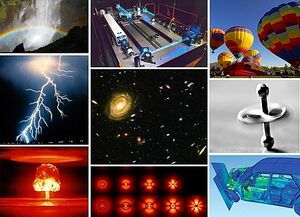Physics
Physics is the natural science that studies matter, its fundamental constituents, its motion and behavior through space and time, and the related entities of energy and force. Physics is one of the most fundamental scientific disciplines, and its main goal is to understand how the universe behaves.
Physics is one of the oldest academic disciplines and, through its inclusion of astronomy, perhaps the oldest. Over much of the past two millennia, physics[1], chemistry, biology, and certain branches of mathematics were a part of natural philosophy, but during the Scientific Revolution in the 17th century these natural sciences emerged as unique research endeavors in their own right. Physics intersects with many interdisciplinary areas of research, such as biophysics and quantum chemistry, and the boundaries of physics are not rigidly defined. New ideas in physics often explain the fundamental mechanisms studied by other sciences[3] and suggest new avenues of research in academic disciplines such as mathematics and philosophy.
Advances in physics often enable advances in new technologies. For example, advances in the understanding of electromagnetism, solid-state physics, and nuclear physics led directly to the development of new products that have dramatically transformed modern-day society, such as television, computers, domestic appliances, and nuclear weapons; advances in thermodynamics led to the development of industrialization; and advances in mechanics inspired the development of calculus..
History
Main article: History of physics
The word "physics" comes from Ancient Greek: φυσική (ἐπιστήμη), romanized: physikḗ (epistḗmē), meaning "knowledge of nature"
Ancient astronomy
Astronomy is one of the oldest natural sciences. Early civilizations dating back before 3000 BCE, such as the Sumerians, ancient Egyptians, and the Indus Valley Civilisation, had a predictive knowledge and a basic awareness of the motions of the Sun, Moon, and stars. The stars and planets, believed to represent gods, were often worshipped. While the explanations for the observed positions of the stars were often unscientific and lacking in evidence, these early observations laid the foundation for later astronomy, as the stars were found to traverse great circles across the sky, which however did not explain the positions of the planets.
According to Asger Aaboe, the origins of Western astronomy can be found in Mesopotamia, and all Western efforts in the exact sciences are descended from late Babylonian astronomy. Egyptian astronomers left monuments showing knowledge of the constellations and the motions of the celestial bodies, while Greek poet Homer wrote of various celestial objects in his Iliad and Odyssey; later Greek astronomers provided names, which are still used today, for most constellations visible from the Northern Hemisphere.
Natural philosophy
Natural philosophy has its origins in Greece during the Archaic period (650 BCE – 480 BCE), when pre-Socratic philosophers like Thales rejected non-naturalistic explanations for natural phenomena and proclaimed that every event had a natural cause.[14] They proposed ideas verified by reason and observation, and many of their hypotheses proved successful in experiment; for example, atomism was found to be correct approximately 2000 years after it was proposed by Leucippus and his pupil Democritus.
Philosophy
In many ways, physics stems from ancient Greek philosophy. From Thales' first attempt to characterize matter, to Democritus' deduction that matter ought to reduce to an invariant state, the Ptolemaic astronomy of a crystalline firmament, and Aristotle's book Physics (an early book on physics, which attempted to analyze and define motion from a philosophical point of view), various Greek philosophers advanced their own theories of nature. Physics was known as natural philosophy until the late 18th century.
By the 19th century, physics was realized as a discipline distinct from philosophy and the other sciences. Physics, as with the rest of science, relies on philosophy of science and its "scientific method" to advance our knowledge of the physical world. The scientific method employs a priori reasoning as well as a posteriori reasoning and the use of Bayesian inference to measure the validity of a given theory.
The development of physics has answered many questions of early philosophers, but has also raised new questions. Study of the philosophical issues surrounding physics, the philosophy of physics, involves issues such as the nature of space and time, determinism, and metaphysical outlooks such as empiricism, naturalism and realism.
Many physicists have written about the philosophical implications of their work, for instance Laplace, who championed causal determinism,[38] and Schrödinger, who wrote on quantum mechanics.[39][40] The mathematical physicist Roger Penrose had been called a Platonist by Stephen Hawking, a view Penrose discusses in his book, The Road to Reality. Hawking referred to himself as an "unashamed reductionist" and took issue with Penrose's views.
Core theories
Though physics deals with a wide variety of systems, certain theories are used by all physicists. Each of these theories was experimentally tested numerous times and found to be an adequate approximation of nature. For instance, the theory of classical mechanics accurately describes the motion of objects, provided they are much larger than atoms and moving at much less than the speed of light. These theories continue to be areas of active research today. Chaos theory, a remarkable aspect of classical mechanics, was discovered in the 20th century, three centuries after the original formulation of classical mechanics by Newton (1642–1727).
These central theories are important tools for research into more specialised topics, and any physicist, regardless of their specialisation, is expected to be literate in them. These include classical mechanics, quantum mechanics, thermodynamics and statistical mechanics, electromagnetism, and special relativity.
- ↑ Physics reference page

